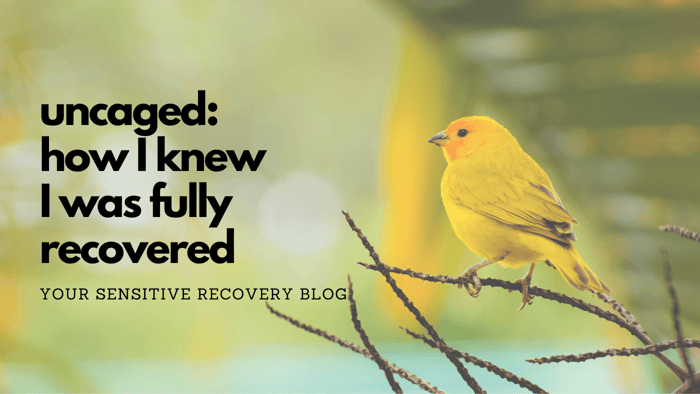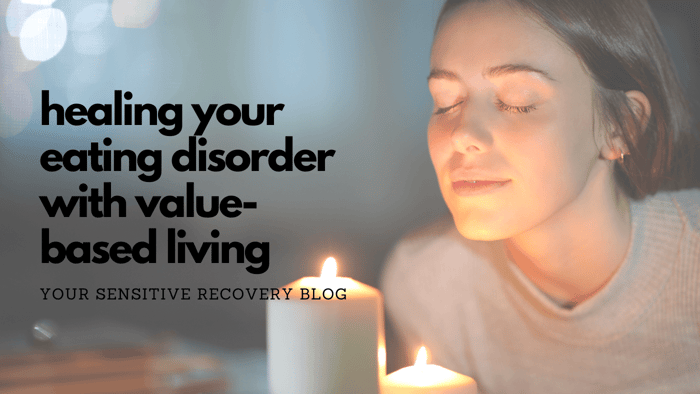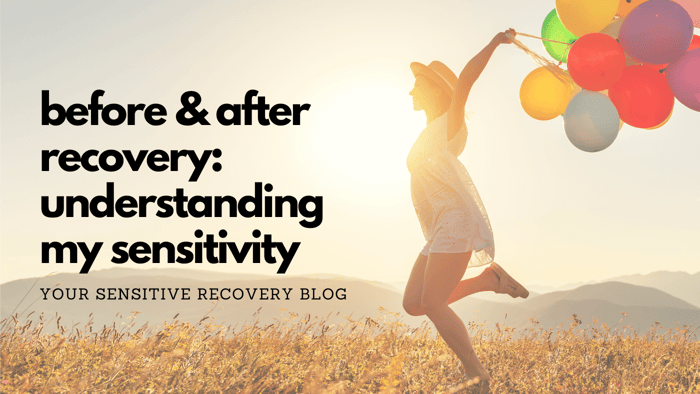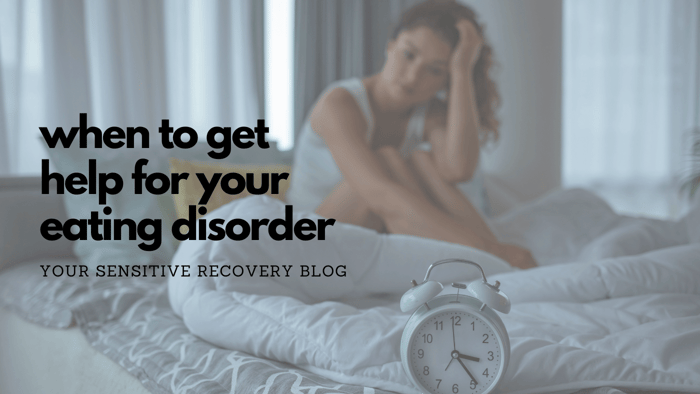Is full recovery from an eating disorder possible? While there are plenty of discussions and differing opinions around this topic, I feel confident in saying, YES - because I am fully recovered.
"But how do you know?"
"How can you be sure you won't relapse?"
I understand questions like that, and the fear beneath them. That's what this blog post is all about. Can I tell the future? No. But I know myself in a way now that I definitely didn't back then. Let's dive in, shall we?
Defining Recovery
From what I've experienced in the decade and a half (or so) that I have lived without an eating disorder, I see now that the word recovery is not the best word for it. Here's a peek at what the Oxford Dictionary says:
Recovery: re·cov·er·y /rəˈkəv(ə)rē/
noun
- a return to a normal state of health, mind, or strength.
- the action or process of regaining possession or control of something stolen or lost.
Ok. So, a return. A regaining. To some extent, this fits. But if that's all we're going for, getting back to the baseline, I'd call that a partial recovery. And I would also be concerned about relapse once again wiping out this progress.
Full recovery, however, goes beyond this. And that's precisely why relapse is no longer a threat. If we returned to who we were before the eating disorder developed, it makes sense that we could very well develop it all over again.
No. The change must go deeper. Farther. Here's what it looked like for me.
Getting At the Roots
If you've ever dealt with an eating disorder, you know good and well that it's about food...but it's mostly not about food. It's way too simplistic to say eating disorders are about control, or a fear of maturation (tell that to the person who develops one in their 50s), or vanity (seriously, don't say that). Perhaps there's a little of all of that tied into some of our journeys, but there is always more.
For me, it was about having a highly sensitive nature and misunderstanding it. It was about fearing anger and having no idea how to feel it or express it. It was about being a good girl, and parroting my way through life, unsure how to explore my own authentic needs and desires. It was about being taught that my body needed to be managed, lest it take up too much space, go out of bounds, or make men sin. And on and on.
Dealing with the roots of my eating disorder may be a lifelong process, even now, as a recovered person. I've had to face how I've been indoctrinated by diet culture, purity culture, patriarchy, etc, and work to deprogram myself.
But my relationship with food and with my body is leaps and bounds from where it was. I now listen closely to my body, with all its wisdom, and align with what feels honest and true. Acknowledging the roots and being open to the gentle, consistent excavation is part of what took me from recovering to recovered.
Trial By Fire
One of the biggest indicators to me that I had recovered was the recognition that I had made it through several extremely stressful times in my life without returning to eating disorder behaviors - without even considering returning to them. They just weren't an option anymore.
This was a big thing, considering I used to turn to the arms of my eating disorder at every opportunity, at every slight stressor.
Being a therapist has helped that, for sure. I strive to live congruently with what I say to my clients, the tools and skills I encourage them to use, and the behavioral shifts they strive for. I have to walk the walk, and at this stage in life, it comes quite naturally. It can for you, too.
But you don't need to work with eating disorders in the future to have this benefit. Connection with anyone you care about is enough because we heal in relationships, and we come to see the part that we play in the greater good. This world needs recovered, empowered humans to dismantle the systems of oppression that are strangling us from within.
Struggle Is Ok
I don't want to mislead anyone by pretending I never have a negative body image day or have considered here and there what it might be like to "lose a little weight." We have to normalize the fact that recovery doesn't take us OUT of diet culture. Yes, it certainly strengthens our resilience to it...
but we're still swimming in that sea.
These disordered thoughts are fleeting when they arise, and I make a point to neither hear them as demands to DO SOMETHING nor freak out about having had them in the first place.
It's not your fault if you struggle sometimes. Like when you get that stupid song stuck in your head. You're not at fault for that. But it is your responsibility to put a stop to it by singing a different song. Nobody else can do that for you.
Believing It's Possible Makes It Possible
That very thought, "Believing it's possible makes it possible" dawned on me during my recovery, and it has become a bit of a mantra over the years. It's now something I share with my clients.
Think about it. If we don't believe something is truly possible, why would we ever put our all into the process? Why would we try that hard for what we might consider a mediocre outcome?
If you have in your mind that you might one day be recovered enough to eat "normally," but will always hate your body, you're not going to put your energy toward the work of deep body image healing.
Look, the truth is, we are so, so powerful.
It's easy to see that disordered thoughts and belief systems fuel and perpetuate disordered eating. Wouldn't it also be true that our thoughts could instead fuel our healing and recovery?
So how do YOU define recovery? What would help you feel confident that your eating disorder was firmly behind you? I love this definition of full recovery by Carolyn Costin. It fits well for me. Maybe for you too.
"Being recovered to me is when the person can accept his or her natural body size and shape and no longer has a self-destructive or unnatural relationship with food or exercise. When you are recovered, food and weight take a proper perspective in your life and what you weigh is not more important than who you are, in fact, actual numbers are of little or no importance at all. When recovered, you will not compromise your health or betray your soul to look a certain way, wear a certain size or reach a certain number on a scale."
Creating your own definition is extremely important because you are the person it will matter to the most. ONLY YOU get to choose to say whether you are recovered or recovering. And either is completely acceptable. You are worthy and valid wherever you are, whatever you call it.
🌻
✨ Josie Munroe, LMFT is a licensed therapist and owner of JosieMunroe.com and Your Sensitive Recovery As a recovered clinician and Highly Sensitive Person, she loves supporting others on their journeys to form new, empowered relationships with food, their bodies, and their sensitivity. Join the newsletter for a weekly boost of hope and inspiration. You deserve a recovery that works for you! ✨





